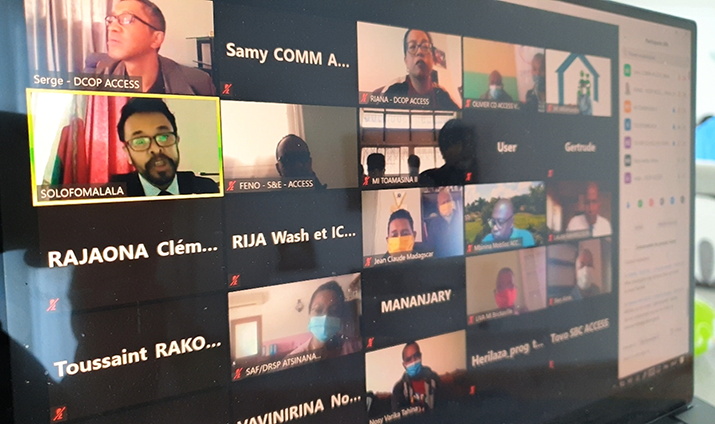Technology Facilitates Efforts to Ensure Continuity of Quality of Care During COVID-19 Epidemic in Madagascar
Technology Facilitates Efforts to Ensure Continuity of Quality of Care During COVID-19 Epidemic in Madagascar
by Misa Rahantason
![[A clinical aide from Madagascar's Atsimo Andrefana region attends an in-person workshop.] {Photo credit: MSH staff}](https://msh.org/wp-content/uploads/2020/10/adc_attending_the_training_-_tulear_715px.png)
Since the start of Madagascar’s COVID-19 outbreak in March of this year, ensuring the continuation of routine health care services has been a challenge. Restrictions on movement and travel have forced health providers to adapt and identify innovative measures for providing quality primary health care in the midst of an epidemic. While in-person training and clinical capacity-building exercises have been curtailed, a timely switch to virtual training and mentorship has helped the Ministry of Public Health (MoPH) and the MSH-led, USAID-funded ACCESS program meet these challenges and ensure the continuation of essential health services for women and children in remote regions of the country.
When the onset of the epidemic threatened the deployment of 118 clinical aides in Atsimo Andrefana, Vatovavy Fitovinany, and Atsinanana regions, ACCESS and the MoPH rapidly developed and hosted virtual trainings and orientation sessions. These clinical aides—doctors, midwives, and nurses recruited to provide critical ongoing support to health facilities—help staff to implement activities needed to improve the quality of care, manage and integrate services, and strengthen data collection.
The presence of clinical aides in their home community health centers, and in the four to five neighboring primary health centers they are tasked to support, stand to significantly improve both facility management and the quality of care available to the area’s more than one million residents. While the work of these clinical aides was threatened by COVID-19, the flexibility and creative thinking of ACCESS and the MoPH training teams allowed for a unique mode of training, adapted to new epidemic realities.
The virtual trainings and mentorship were coupled with a series of mini-groupings under strict physical distancing guidelines, in which each region’s clinical aides and MoPH teams put their knowledge to the test and applied what they learned, ultimately verifying their skills.

The Secretary General of the MoPH, Professor Solofomalala Gaëtan Duval, opened the virtual sessions by speaking to the importance of training and the importance of clinical aides in improving the quality of care at health facilities. Throughout the three-week training, ministry experts in reproductive, maternal, newborn, and child health; malaria; nutrition; disease surveillance and response; and health information systems co-facilitated technical sessions. ACCESS program advisors also rotated through virtual rooms to share information on the role their work will play in achieving program goals, such as increasing skilled birth attendance. According to midwife Faniriantsoa Émilienne Alice, from the primary health center in Androrangavola, “Thanks to this three-week training, we were able to reinforce our knowledge on very relevant topics, such as the humanization of care, and learn relatively new concepts, such as behavioral and social change.”
Medical inspectors and regional and district management teams also had the opportunity to share specific situations and challenges that await them once they start. “It is very important that these clinical aides are fully aware of the tasks entrusted to them within their home primary health center. For this reason alone, holding this orientation, despite the COVID-19 epidemic, was essential,” explained Dr. Ramanantonandrasana Joachim, medical inspector of Nosy Varika. Thanks to the use of new trainings technologies, Dr. Joachim was particularly enthusiastic about their use in overcoming the constraints of working in a remote district.
“We dare to hope that soon the key health indicators will increase significantly and that we can together affirm that the regional teams are doing a good job,” shared Dr. Germain Rakotozafy, regional director of public health of Vatovavy Fitovinany. “However, the key to this success lies in the joint monitoring of the work of these clinical aides.”
In 2021, an additional 193 clinical aides will be recruited and deployed to seven more ACCESS support regions: Diana, Sava, Sofia, Melaky, Boeny, Menabe, and Analanjirofo.